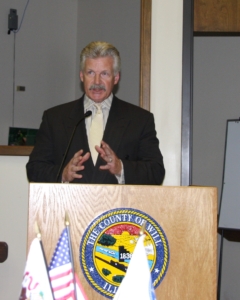State’s Attorney Glasgow and County Executive Walsh Announce $500,000 Federal Grant for Will County Drug Court
October 2, 2019
JOLIET – Will County State’s Attorney James Glasgow and Will County Executive Larry Walsh announce that the Will County Drug Court has been awarded a $500,000 federal grant through the U.S. Department of Justice’s Adult Drug Court Discretionary Grant Program. The grant submission was a cooperative effort of the offices of the Will County State’s Attorney and the Will County Executive.
“The award of this highly competitive grant is a testament to the excellence of Will County’s Drug Court Program,” Glasgow said. “These funds will be used to expand the number of individuals in the program, as well as to enhance the services we provide to those suffering from addiction. This grant allows us to continue providing outstanding services for those who are suffering as a result of the heroin epidemic that has swept our nation, so that these individuals may again become productive members of society.”
State’s Attorney Glasgow spearheaded the creation of the Drug Court in the late 1990s, when he wrote the grant leading to its formation. Since its inception, 481 individuals have graduated from the program.
“For more than 20 years, the Drug Court program established by State’s Attorney Glasgow has been offering a second chance to those with substance use disorders who have committed nonviolent crimes,” said Will County Executive Larry Walsh. “I am proud to work with the State’s Attorney on a variety of programs to help individuals dealing with substance abuse. We must continue to do all we can to enable individuals to receive treatment and counseling so they can ultimately return to their families and jobs as successful members of our communities.”
Defendants in Will County Drug Court plead guilty up front, and criminal charges are dismissed if they complete the intensive program. Participants must remain drug free, submit to random drug tests, find work, follow through with treatment, and attend weekly counseling sessions.
The Drug Court was Will County’s first Program Solving Court. Glasgow also has established three residential facilities to further assist Problem Solving Court participants on their paths to reentry. The Miller Taylor House and Julie Ann House offer temporary housing. The Connor Kelly Residence, which opened its doors earlier this year, provides longer-term transitional housing.
“Our Drug Court has helped integrate individuals with substance use disorders back into the community by helping them break the addictions that drove them to commit nonviolent offenses,” Glasgow said. “As a society, we must do all we can to help individuals get back on their feet.”



